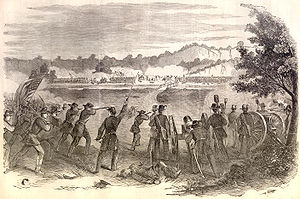Battle of Carthage (1861)
| Battle of Carthage | |||||||
|---|---|---|---|---|---|---|---|
| Part of American Civil War | |||||||
 |
|||||||
|
|||||||
| Belligerents | |||||||
|
|
|
||||||
| Commanders and leaders | |||||||
| Franz Sigel | Claiborne F. Jackson | ||||||
| Units involved | |||||||
| Missouri State Guard | |||||||
| Strength | |||||||
| 1,100 | 4,000 armed 2,000 unarmed |
||||||
| Casualties and losses | |||||||
| 44 | 200 | ||||||
The Battle of Carthage, also known as the Battle of Dry Fork, took place at the beginning of the American Civil War on July 5, 1861, in Jasper County, Missouri. The experienced Colonel Franz Sigel commanded 1,100 Federal soldiers intent on keeping Missouri within the Union. The Missouri State Guard was commanded by Governor Claiborne F. Jackson himself and numbered over 4,000 soldiers led by a hero of Mexico, Sterling Price, along with 2,000 unarmed troops who did not participate in the battle. The battle was a strategic victory by the Missouri State Guard in large part owing to new tactics introduced on the battlefield by independent partisan rangers serving with Capt. Jo Shelby. Carthage played a part in determining Missouri's course during the war, as it helped spark recruitment for the Southern regiments. A founder of the county who fought in the battle and was then elected Lieutenant Colonel of the 13th Missouri Cavalry Regiment and 5th Missouri Infantry, attorney Robert Wells Crawford served as a recruiter for the Confederate Army in Missouri, a post he was nominated for by Waldo P. Johnson, formerly a United States Senator from Missouri in a letter to Missouri governor-in-exile Jackson dated October 24, 1862.
Political views in Missouri were divided before the Civil War. St. Louis and its surrounding counties generally sympathized with the Northern states because that region was connected economically with the North. The area also had few slaves and contained a large German immigrant population, most of whom opposed slavery. Missouri Governor Claiborne F. Jackson was pro-Southern, and the rest of the state was very heavily divided. Publicly Jackson tried to stay neutral, but he was suspected by the Union men of secretly preparing the state militia to seize the Federal Arsenal in St. Louis.
...
Wikipedia
